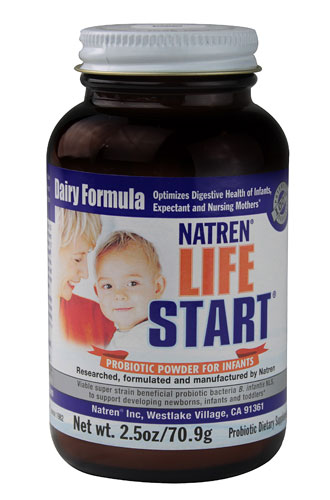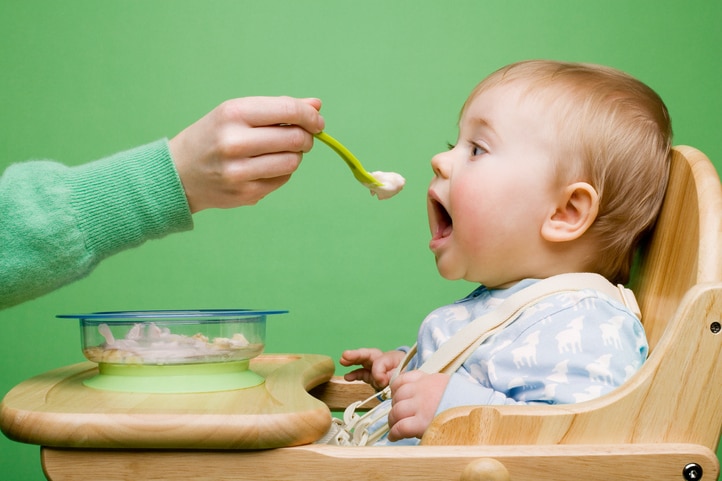As a savvy mother—and a savvy shopper—you’ve probably seen whole shelves dedicated to probiotics for babies, just as you’ve probably been privy to the onslaught of information about giving infants and kids “good” bacteria. But before you jump on the bandwagon and start giving your child probiotics, you may want to determine if they’re right for your little darling—and, if so, which foods or supplement will be the best fit.
Here’s the lowdown on probiotics for babies.
What are probiotics, anyway?
Probiotics are live bacteria and yeasts that naturally support intestinal balance and digestive health. Average adults have roughly 400 types of bacteria colonizing their bodies, and these organisms aid in the production of nutrients, help us to detoxify compounds and work with our immune system to encourage overall well-being.
These bacteria are a combination of good, bad and…well, indifferent (in other words: benign). The key to them interacting optimally is, like most things in life, balance, a rather delicate equilibrium that can go awry from stress, antibiotics, excessive sugar and other factors. A number of foods may foster good flora in our tummies, including yogurt, kefir, fermented veggies (like brined olives, pickles, sauerkraut, and kimchee), tempeh, miso soup and aged cheeses such as cheddar and gouda, thereby supporting a more balanced GI tract.
Your baby’s intestinal system—despite its itty-bitty size—works in the same way. While it may be hard to believe, your child’s GI tract contains many millions of bacteria, including the microbes they picked up when they passed through your birth canal. (Children who are born via C-section may need an extra boost of probiotic care.†) Likewise, if put on an antibiotic your child is vulnerable to GI tract upsets—which he or she will let you know about, loud and clear!
How, then, can you support rebalance—and get them grinning again?
If you nurse, you are already facilitating the colonization of good bacteria in your little one’s stomach, as breast milk contains what’s called prebiotics—a type of fiber substance that naturally advocates the growth of good flora. (Eating specific foods, such as apple skins, bananas, onions and artichokes, can also enhance the promotion of good bacteria.) What’s more, your breastmilk contains immunoglobin A (IgA), which supports the lining of your child’s gut.
But your pediatrician—or your favorite friend in Mommy and Me—might have suggested augmenting your child’s diet with probiotics, especially if they’ve recently been treated with antibiotics.
While probiotic supplements should not be considered a cure-all for your child’s gastrointestinal distress or other ailments, Parents magazine reports that research “has shown that consuming probiotics through foods or supplements can positively affect your child’s balance of bacteria, and consequently, his health.”†
Here are a few things to consider:
Strain
As Parents also reports, “your child’s GI tract is as unique to him as his fingerprints are.”
With that in mind, it’s important to realize that not all strains of probiotics can support every aspect of your child’s health. Research suggests that the best probiotics for babies are those that contain two to three strains of probiotics. These are your leading options:
Lactobacillus and bifidobacterium are two of the most beneficial bacteria naturally occurring in the body. The former may support healthier digestion and recovery from diarrhea; within this, there’s also the Lactobacillus reuteri strain, which may naturally support relief from colic. The latter supports digestion as well, and, like others, also organically encourages immune health.†
Meanwhile, B. Bifidum—one of the first strains to appear in an infant’s intestines—naturally supports nutrient absorption and digestion. Another strain commonly seen in probiotics for babies is B. Infantis, which can promote a healthier tummy lining to combat bloating and gas; it can also organically support the breakdown of lactic acid in breast milk.†
Dose
Both fortified foods and probiotic supplements typically list the amount of live bacteria present, and may range from one billion to ten billion colony-forming units. One to three billion live cultures per day is the most common dosage for infants.
Form
One of the beauties of modern science is that we now have an array of ways to take supplements—and this holds true for babies.
Probiotics are offered in drops, powders, chewable tablets, and edible items, such as straws coated with probiotics or even probiotic chocolate candies. Some parents choose to dampen a finger, dab it in probiotic powder, and place the finger in their child’s mouth to let them suck on it. Others elect to use liquid supplements, which they add to breast milk or formula, or feed it to their child directly by spoon. And when your child is ready to eat solids—usually around six months—you can consider feeding him or her probiotic-rich foods. A good one to try? Yogurt containing live cultures.
Whichever way you choose to boost your child’s intake of probiotics, do know that the American Academy of Pediatrics says that your sweetheart’s gut flora will return to its previous levels when the supplements are discontinued. Also, before starting your child on probiotics, be sure to speak with your pediatrician. And remember, a happy, healthy mama usually translates to a happy, healthy baby—meaning, you may benefit from taking probiotics too.
†These statements have not been approved by the Food and Drug Administration. These products are not intended to diagnose, treat, cure or prevent disease.





